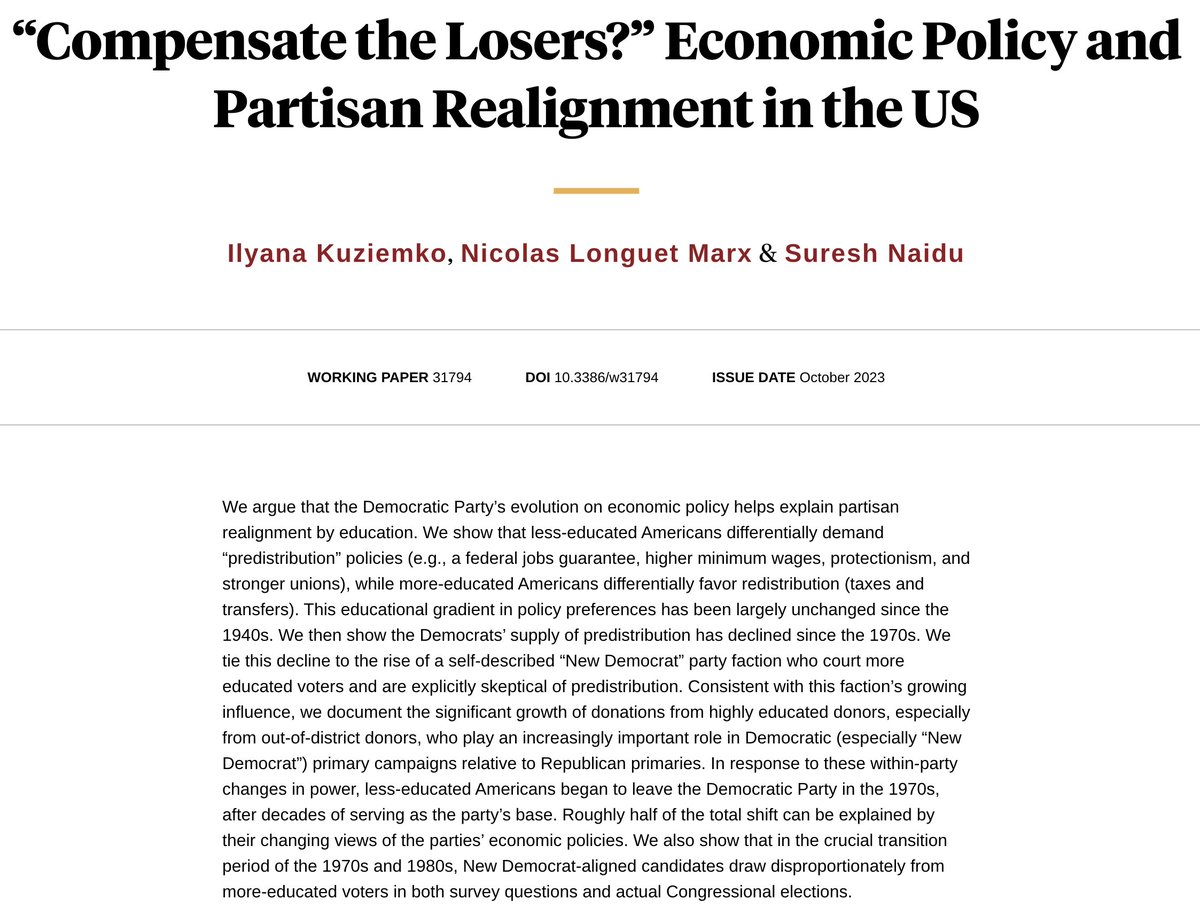I am very excited to share our new NBER WP with @ikuziemko and @snaidunl: “Compensate the Losers”: Economic Policy and Partisan Realignment in the U.S.
A short summary of the paper below.
nber.org/papers/w31794
A short summary of the paper below.
nber.org/papers/w31794

Using 80 years of data, we find that the educational realignment, causing Democrats to lose less-educated voters, began in the 70s and has maintained a similar pace since then. We argue that the rise of a conservative faction in the Democratic Party is a key driver of this shift.
We harmonized more than 200 surveys on economic policy preferences since the 1940s. We show that less-educated voters have consistently favored predistribution policies (e.g., minimum wage, labor unions, protectionism, job guarantees) over redistribution (taxes & transfers). 

We then examine parties’ supply of economic policies. Since the mid-1970s, Democrats have started to move away from predistribution policies. When Democrats held the Speakership, the share of such bills on the floor declined, while redistribution bill shares remained stable. 

This shift away from predistribution coincided with the rise of a faction within the Democratic party that called themselves the “New Democrats” and would eventually form a more official organization called the Democratic Leadership Council (DLC). 

We analyze vote patterns in Congress to show that this faction was generally more conservative than other Democrats but especially so on predistribution topics, measured by topic-specific ideal points and congruence with Republicans.
We also provide evidence that educated donors have started to play an increasingly important role in Democratic primary races relative to Republican primaries, following FEC reforms in the 1970s which have reduced the political influence of labor unions. 

We document a rise in educated out-of-district donations. While, until the 2000s, average Democratic voters were still less educated than Republicans, out-of-district Democratic Primary donors have been consistently more educated since at least 1980. 

In contrast, in-district Primary Democratic contributors only became more educated than Republican contributors in the 2000s, just like their voters. 

Looking at politicians’ biographies, while in the decades immediately after WW2, Republican legislators were significantly more likely to come from Ivy League universities. The reverse is true today, with the inflection point again occurring in the 1970s. 

Finally, we trace out voters’ reaction to this change in the Democratic party. First, we harmonize over 800 surveys (N > 2M) and show that the education gradient in party identification has been stable until an inflection point, which we formally estimate as occurring in 1976. 

Using survey election experiments from 1972 to 1992, where most Democratic Presidential Primaries were a choice between a “New” vs. an “Old” Democrat, we find less-educated voters supported Republicans more when they were facing a “New Democrat” rather than an “Old Democrat”.
We find similar patterns using fine-grained election results from the 1980s: DLC House candidates were obtaining larger vote shares from more-educated areas than “Old Democrats.”
Finally, we consider a few alternative explanations for this political realignment. In particular, we provide arguments to rule out that social issues have been the driving force of this realignment in the 1970s.
First, we show that the Democrats’ increasingly liberal positions on Civil Rights since the 1940s have actually led them to lose more high-educated white Southern voters than less-educated white Southern voters. 

Second, our survey data shows a constant educational gradient on social topics, with educated voters tending to be more liberal. Given DLC Democrats were socially more conservative, the differential support they got from educated voters was in spite of their social stances. 

Overall, we don't claim that Democrats' economic policy shifts fully explain the realignment; other factors likely played a role. Specifically, we find that at most half of this gradient shift can be attributed to voters' perceptions of the parties' economic policies. N/N
• • •
Missing some Tweet in this thread? You can try to
force a refresh





